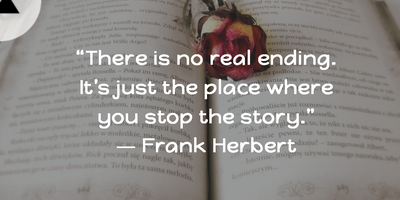I saw a comment by someone on LinkedIn, saying how it was easier to open a bank account than to close it. And I thought that was so true. While opening everyone made such fuss over you, made you feel special there would certainly be more than one person. But closing you had to go looking for people, you were the one holding all kinds of paper, and certainty not at all important. Strange.
Strange and true of many other things. Like when we checked-in at the airport, with so much fuss and then when we stood alone waiting for the bags in the end. It made me think of Endings.
It had such an ominous ring to it. And yet we waited for The End.
I binged watched “The Good Doctor”. It was the first time, I came to know what binge watching meant. But I also found myself in a strange zone of avoiding the endings. I found the paradox quite intriguing; I wanted to move ahead and know what’s next – but I was also avoiding the end.
And yet, I remember also in the good old days of going to watch a Movie in a theatre, ahh!! You kind of know when the movie is ended but you still sit and wait till “The END” flashes on the screen. Then you know it’s over and feels complete. Till then, I noticed people will get up and slowly walk but still kind of linger, keep looking at the screen. After the The End. Peoples pace gait volume everything changes.
What is it about endings that is so different so uncomfortable so final ?
And how come we don’t notice them, or maybe we don’t want to.
Things end, all the time. Things have ended. A million things have ended.
School ends, days end, party ends, college ends, relationships end, book ends, series ends, ice-cream ends, pizza ends, days before the mobile phone ended, days of going to movies ended, days of picking my son up in my arms ended, days of having long conversation with my best friend in the night ended, seasons ends, festivals end, so many other things have ended.
And we have clearly made it through – and Yet!!
We even don’t like using the word, we substitute it with fancy words like finale, closure, completion culmination. Why not Ending.
All things that begin end. But we don’t really want them to. Are we afraid of what will happen?. Are we afraid of the empty feeling at the end of the “event”. Where we find ourselves in uncharted territory, without a reference point of a book, an episode a relationship?
The Void – Is that what we Avoid?
I also wondered.
If we did not avoid – and did pay attention to the fact that it would end, as was inevitable – would we be watching with more attention, with more presence, with more curiosity and openness. Like the last few morsels of a burger, and last 15 minutes of a picnic on the bus when we would be exhausted and yet wanting to stretch the time just a little bit, sip the last few drops of the drink and taste them as the best?
What if Ending were a bookmark. A deliberate place you can visit because it was important.
Endings are sad, inevitable but they also seem to have a clarifying effect, one that often highlights the good.
Research is exploring just how powerful endings can be for our well-being. It suggests that by simply imagining that things are coming to an end—a stage of our lives, our time in a certain place, a relationship—we may be able to better appreciate them before real endings loom.
I watched Nine perfect strangers, Spoiler Alert !! and towards the end, people are put in a room, people who are complaining, bickering, only looking at what is and has been wrong in their lives etc. and suddenly the they realize they are locked and can’t get out and the room starts to heat as if there is a fire outside. And everyone now believes these are last times. And everyone then starts to say, if this is the end what would they really want – people say things which they have perhaps not even dared to say to themselves- they are vulnerable -open to take risks with their last few minutes – dare to hope – One last time.
Ending clarifies – Cuts the excess – makes things bare bone and essential.
In a 2017 study published in the Journal of Positive Psychology, Kristin Layous and her colleagues recruited nearly 140 college freshmen for a peculiar month-long experiment. Half of them were instructed to live that month as if it were their last in their college, town, paying attention to the special people and places they would miss when they left. The other half, a control group, simply went about their days as usual. Each week, the students journaled about how they had spent their time.
Before and after the experiment, all the students filled out surveys about their well-being: how satisfied they were with their lives and how much positive and negative emotions they were experiencing. They also reported how much their fundamental psychological needs for autonomy, competence, and connectedness were being met—how free, capable, and close to others they felt.
Compared to the control group, the group who imagined they were leaving soon increased in well-being, partly through the satisfaction of their psychological needs. The prospect of college ending didn’t sadden them, but in fact seemed to enrich their experiences.
“Imagining time as scarce prompted people to seize the moment and extract greater well-being from their lives,” Layous and her co-authors write. This study—together with some prior research—suggests that imagining endings is a sneaky way, a hack to increase happiness. We tend to assume it’s bad for us, but, in fact, the opposite appears to be true.
The last year and half of ‘endings or near endings” – seems to also point in the same direction. COVID has made a difference in many peoples lives and their perspective. I can say that for myself, my son and husband both got it, It was bad. And I suddenly came face to face with how “other things” that we worry about fight about were so insignificant. How also, faith became so much more obvious for me and so soothing.
Endings have a clarifying effect. It puts, what is really Important into perspective and why it is important. It in-fact brings us closer to ourselves, our near and dear ones and God.
Laura Carstensen’s “Socio-emotional selectivity theory,” which looks at how our sense of time affects our goals and relationships was ground breaking. Socio-emotional selectivity theory is a lifespan theory of motivation which states that, as time horizons grow shorter, people’s goals shift such that those with more time prioritize future-oriented goals and those with less time prioritize present-oriented goals.
When we perceive time as vast and expansive, the theory goes, we tend to prefer knowledge-seeking activities: attending school, going to networking events, learning new skills. These activities are an investment in the future, often involving some degree of difficulty and struggle.
When we perceive time as short and limited—in other words, when endings seem near—we tend to prefer activities that feel good or meaningful now, like hanging out with our best friends or enjoying our favorite foods.
Endings do have a funny way of new beginnings also, even though we don’t see or imagine it like that. But if we do just look back at our own lives we will now its is true. It’s funny how selective we are in our recall and imagination.
And oh, I don’t think there is such a thing as Happy endings, no matter what Enid Blyton says. The happiness part is the bit just before the Endings If we anticipate them.
Perhaps, talking contemplating endings as a “Practice” is a good thing. Perhaps if we did see it we would be more in the present. Perhaps knowing one day definitely everything will end, good, bad ugly, days, life, and problems, we can take more risk of being in the present. More open to the hopes for what really matters. Perhaps we need to start with “The End” and track back from there. Perhaps we could have a whole different journey. Beginning are perhaps overrated. “Begin with the End in mind” now has a whole new meaning.







2 Comments